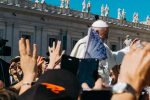George H.W. Bush: President As Servant Leader
Dec 15th, 2018 | By Dr. Jim EckmanGeorge Herbert Walker Bush (1924-2018) died on Friday evening, 30 November 2018. He had a form of Parkinson’s disease that forced him to use a wheelchair or motorized scooter in recent years. He served as president from 1989 to 1993, capping a career of more than 40 years of public service. A decorated Navy pilot (compiling 126 carrier landings and 58 missions) who was shot down in the Pacific in 1944, he was the last of the World War II generation to serve as president. President Bush was a skilled negotiator and diplomat and, as president, helped end the Cold War and the threat of nuclear engagement with a careful handling of the Soviet Union’s collapse and the liberation of Eastern Europe. James A. Baker III, former Secretary of State, said of President Bush: “[He] was the best one term president the country has ever had, and one of the most underrated presidents of all time. I think history is going to treat him well.”








